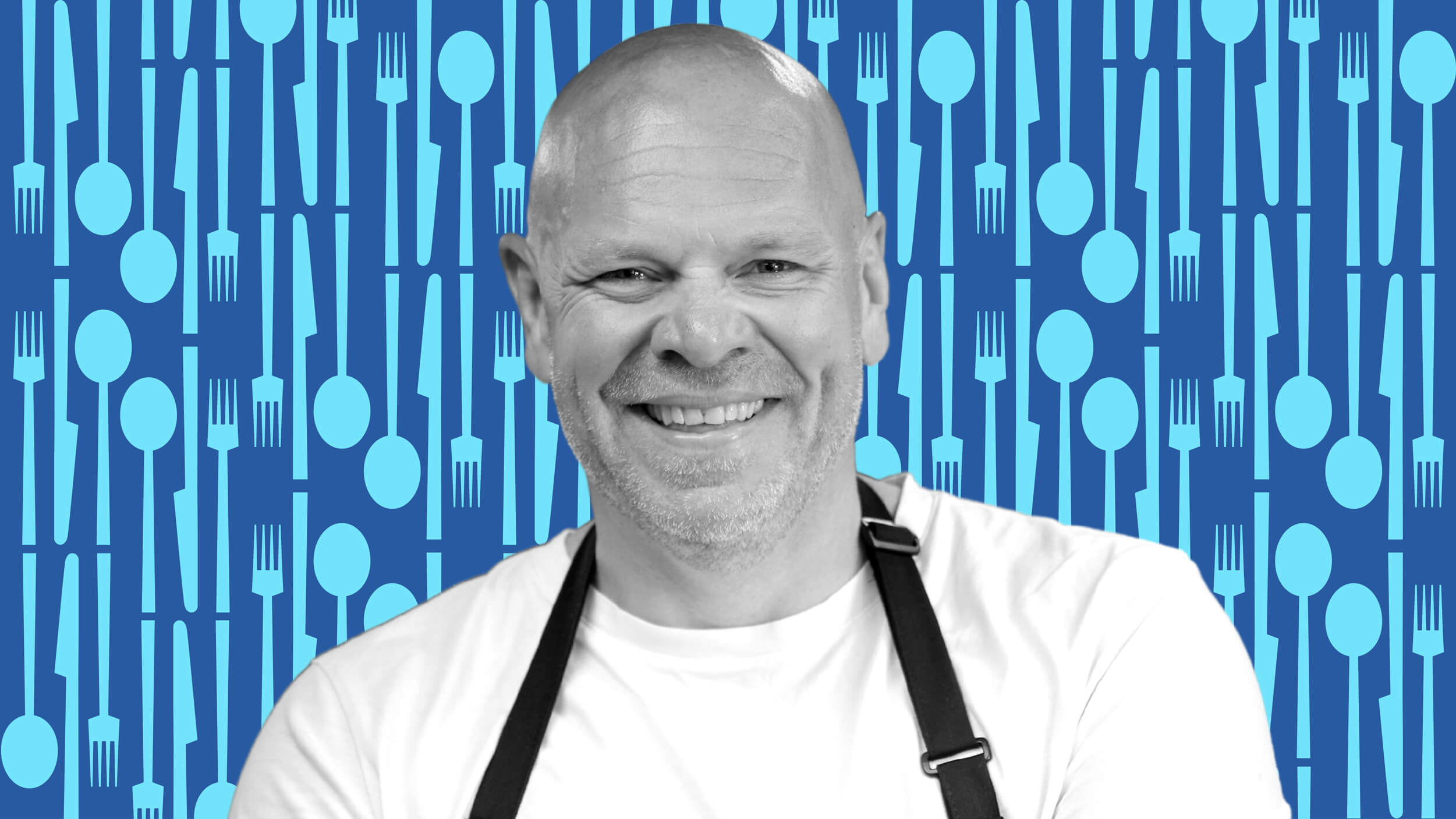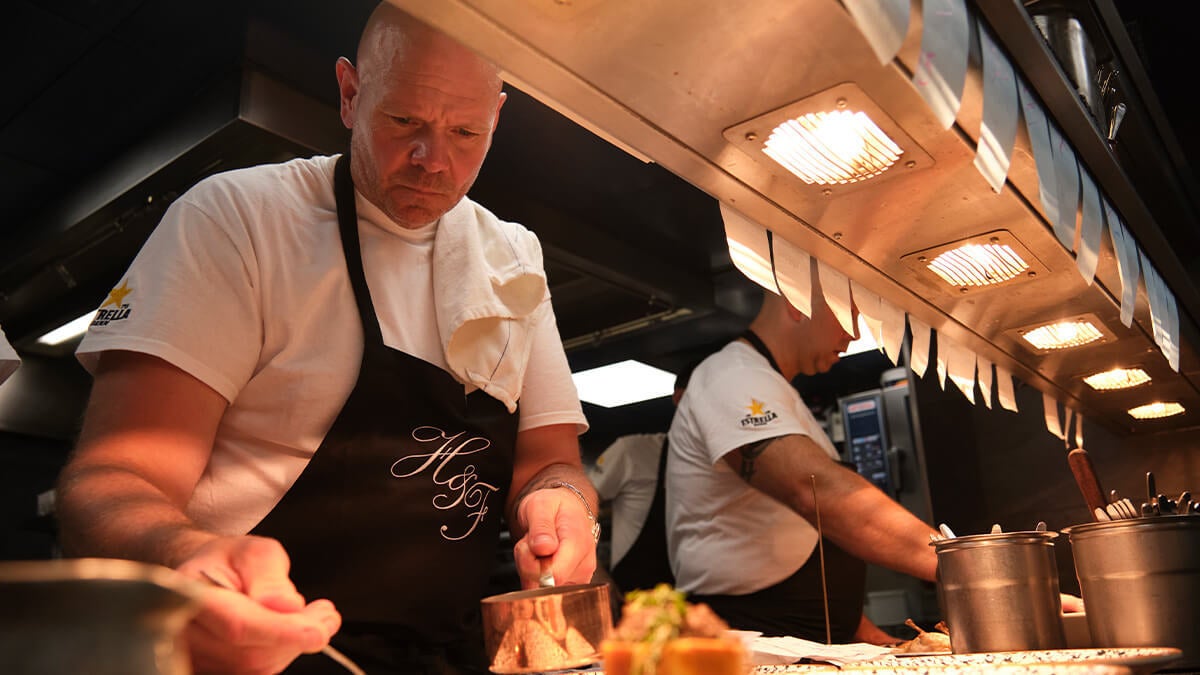
At first sight, Tom Kerridge’s towering physique and vice-like handshake might seem at odds with his butter-soft West Country burr and bubblegum-pink sweater. But, the gentle giant claims, there are no such contradictions between his chosen profession and his politics.
He offers a warm welcome to The Hand & Flowers, the pub and restaurant he bought with his wife Beth in Marlow, Buckinghamshire, 17 years ago. Bearing two Michelin stars, it remains the flagship venue of the Tom Kerridge Group.
Kerridge stresses that it’s perfectly possible to be both a restaurateur providing the finest dining money can buy and a social campaigner helping people in food poverty. “Those two things,” he says, “can sit very, very separately.”
A self-made entrepreneur, whose rise from pot washer to celebrity chef has been well documented, Kerridge says that he wouldn’t begrudge anyone else their success. That’s hardly surprising, given that his customers are more likely than not to be wealthy captains of industry themselves. At £87, the price of The Hand & Flowers’ sirloin steak and chips has attracted criticism in some quarters of the media, but he sees no problem in charging that much.
Gesturing at the “luxury space” around him, he declares with obvious pride that his acclaimed gastropub provides both “top-quality ingredients and the services of highly skilled staff who deserve to be paid properly”.
But Kerridge is not out of touch with the realities facing the millions of ordinary Britons who may have to choose between eating and heating this winter. Having grown up in a working-class, single-parent household, he is committed to offering “food education” to those already struggling to eat healthily and affordably as the cost-of-living crisis bites ever harder. To this end, he has partnered with Marks & Spencer, Meta and footballing philanthropist Marcus Rashford to design a range of “pocket-friendly” meals. Kerridge says that he wants to help people by sharing some of the cookery skills he has acquired.
A progressive employer
The Tom Kerridge Group comprises six venues, a catering service and a private dining room for hire. There are a couple of mid-priced establishments within it: The Coach and The Butcher’s Tap & Grill, both of which are in Marlow too.
The group has earned a reputation as a progressive employer, which makes it something of a rarity in the hospitality industry. Kerridge says that it pays “above market rate” and offers staff a range of benefits and perks, including a share scheme and gym membership.
“It’s similar to the John Lewis Partnership model,” he notes. “When the profits come through, the staff get a percentage of them. We don’t do any form of service charge or tips here. Everything’s built into the price so that all staff get the correct wage. If we do well, they do well. The business is like a family.”
He is proud of the group’s employee retention record, noting that some members of staff “have been with us for between 12 and 15 years. It’s about creating an environment where people feel comfortable and confident that they can develop. It isn’t always about money; it’s about being given the opportunity to grow on a personal and professional level.”
Everything is built into the price so that all staff get the correct wage
Indeed, Kerridge says he would sooner expand or adapt the business than lose his most valued employees. He cites the example of Nick Beardshaw, who has been with the company for nearly 13 years.
Beardshaw built a wealth of knowledge and skills as a sous chef working with Kerridge at The Hand & Flowers, which inevitably led to “the point when he was seeking his first position as head chef. This meant that we were faced with a choice: either grow the business and give him that opportunity here or lose an incredible cook.”
Kerridge chose to retain him by opening his second venue, The Coach, in 2014. Beardshaw took with him another highly talented sous chef, Tom De Keyser, who returned to The Hand & Flowers as head chef after helping The Coach to earn a Michelin star. When Kerridge’s Bar and Grill opened in London in 2018, Beardshaw moved on again to become its head chef.
Clearly a believer in developing and promoting talent, Kerridge points out that “people are more invested in a firm they’ve helped to create”.
Chef first, CEO second
Asked whether he considers himself a chef or a CEO first these days, Kerridge doesn’t hesitate: “I’m always a chef first.” Any business decisions, he says, are based on whether they pass the simple litmus test: “Does it taste good?”
Kerridge has taken on every kitchen responsibility, even the unglamorous ones, since he started his career at Calcot Manor in his native Gloucestershire. He thinks it is vital to understand ”the DNA of a restaurant” and, with that in mind, recommends that any CEO, in any business, should spend as much time at the coalface as they do in the head office.
“If you join a business at a senior level you have to learn how to run that position – but also everything under it. Every job is important,” he says.

According to Kerridge, as much as the impact of the coronavirus pandemic, the UK’s decision to leave the EU presents one of the biggest threats to the hospitality industry.
“There isn’t a single positive of Brexit for our industry. Not one. No one can explain it. Not one person has ever given me a reason for why it’s worked. It raised food prices and disrupted supply chains,” he says. “Even one of the big drivers of Brexit, the owner of Wetherspoon [Tim Martin], is starting to talk about manpower. We’ve lost access to a skilled workforce and that has not been replaced.”
There’s a real buzz when everyone comes together to produce a great service
With the prospect of a recession, when everyone might be evaluating their outgoings more meticulously, is he concerned? Is there a groundswell to lower prices, so that the luxury market might be opened to a wider audience?
“I don’t think you can compromise on pricing without compromising on the product,” he ponders. “We operate in a niche space [at The Hand & Flowers. [Even in a recession] there are still people with disposable income.”
Kerridge suggests he would rather focus on “consolidating” an existing customer base than gambling on “casting the net much wider”. He accepts that people who previously saved up to go to The Hand & Flowers “a few times a year” might go less often, but observes that ”there’s always going to be a birthday, an anniversary or some special occasion.”
Kerridge describes himself as “not a Michelin-star kind of guy” even though he has three. He produces fine food but isn’t pretentious. And he doesn’t like to boast but is aware of how good he is.
Hospitality is a tough trade, yet Kerridge can’t imagine himself doing anything else. Working in a kitchen is “adrenaline-fuelled”, he says with a grin. “There’s a real buzz when everyone comes together to produce a great service. It’s hard work but we enjoy making sure that other people have a nice meal and a nice time.”

At first sight, Tom Kerridge’s towering physique and vice-like handshake might seem at odds with his butter-soft West Country burr and bubblegum-pink sweater. But, the gentle giant claims, there are no such contradictions between his chosen profession and his politics.
He offers a warm welcome to The Hand & Flowers, the pub and restaurant he bought with his wife Beth in Marlow, Buckinghamshire, 17 years ago. Bearing two Michelin stars, it remains the flagship venue of the Tom Kerridge Group.
Kerridge stresses that it’s perfectly possible to be both a restaurateur providing the finest dining money can buy and a social campaigner helping people in food poverty. “Those two things,” he says, “can sit very, very separately.”
